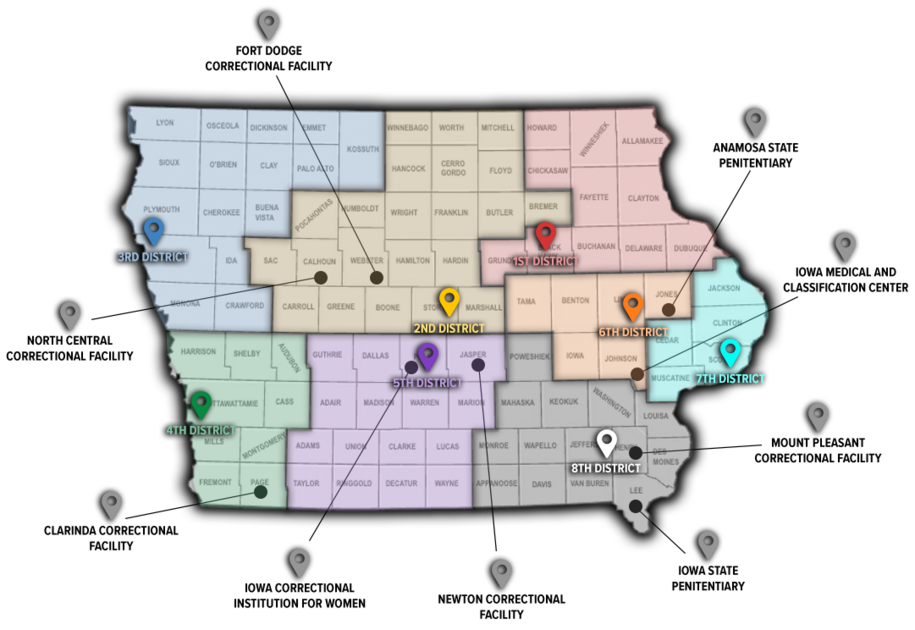
List items for Accordion - Districts & Prisons - Districts

| About |
|---|
| Community-based corrections provides correctional supervision and services in a community setting as an alternative to jail or prison. |
| District | Headquarters |
|---|---|
| 1st District | Waterloo, Iowa |
| 2nd District | Ames, Iowa |
| 3rd District | Sioux City, Iowa |
| 4th District | Council Bluffs, Iowa |
| 5th District | Des Moines, Iowa |
| 6th District | Cedar Rapids, Iowa |
| 7th District | Davenport, Iowa |
| 8th District | Fairfield, Iowa |
List items for Accordion - Districts & Prisons - Prisons

| About |
|---|
| Iowa has nine correctional institutions with varying security levels. Placement decisions are made based on an objective custody classification assessment/reassessment process. |
| Prison | Location |
|---|---|
| Anamosa State Penitentiary | Anamosa, Iowa |
| Clarinda Correctional Facility | Clarinda, Iowa |
| Fort Dodge Correctional Facility | Fort Dodge, Iowa |
| Iowa Correctional Institute for Women | Mitchellville, Iowa |
| Iowa Medical and Classification Center | Coralville, Iowa |
| Iowa State Penitentiary | Fort Madison, Iowa |
| Mount Pleasant Correctional Facility | Mount Pleasant, Iowa |
| Newton Correctional Facility | Newton, Iowa |
| North Central Correctional Facility | Rockwell City, Iowa |
List items for Accordion - Districts & Prisons - Supervision & Services

| Supervision & Services |
|---|
| Granted by the board of parole. It is for a set period of time following time in prison. Parolees undergo the same assessment, case planning, and treatment referral processes as probationers. |
| Supervision & Services |
|---|
| Provide the court with background information on the defendant. It also helps the judge with sentencing decisions. |
| Supervision & Services |
|---|
| Provide supervision for some arrestees prior to disposition of their criminal charges, to ensure all court appearances and obligations are met. |
| Supervision & Services |
|---|
| A decision made by the sentencing judge. It allows the offender to remain in the community instead of spending time in prison or jail. Offenders placed on probation go through an objective assessment process. This helps decide the supervision level needed and the level of risk the offender is to the community. It also aids in case planning needs. Supervision may range from very little to intensive. It may involve electronic monitoring. Referrals to correctional programs, local treatment providers, and other resources are an option. |
| Supervision & Services |
|---|
Non-secure housing that provides 24-hour supervision. Offenders are able to leave the facility for approved job-seeking, employment, or treatment. Many different offender situations are live in these residential facilities.
|
| Supervision & Services |
|---|
| For sex offenders, as set by the Iowa Code. It occurs after the offender serves the criminal penalty part of the sentence. It can be for a lifetime, depending on the convicting offense. Assessment, case planning, and treatment referral processes are identical for all supervised offenders. |
